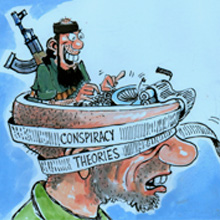
Hay sectores musulmanes que afirman que el Corán prohíbe el acto de dibujar personas y animales, por lo que estatuas, pinturas y caricaturas son vandalizadas, del mismo modo que sus creadores son blanco de ataques de extremistas islámicos. Un país cada vez más fanático e intolerante es Pakistán, dominado por el miedo a pequeños grupos de los talibanes y otras facciones fundamentalistas. La ceguera de la estupidez, la intolerancia a la irracionalidad pueden crecer en sociedades asustadas, pero mientras la inteligencia sea una característica humana, siempre habrá quienes permanezcan en la lucha por mantener la evolución de una civilización ilustrada y racional. Es lo que hacen artistas paquistaníes como Sabir Nazar y Nigar Nazar que, pese a tener el mismo apellido, no son miembros de la familia.
Sabir Nazar es uno de los principales caricaturistas políticos de ese país a quien cada vez le cuesta más expresar su obra: «Es realmente muy difícil hacer caricaturas sobre temas como el extremismo, la militancia o incluso el sistema judicial y el ejército. Así que en estos momentos el espacio para trabajar en Pakistán es muy limitado”.
Su periódico ha sido víctima de varios ataques porque la “Ley sobre Blasfemia” general de Pakistán salvaguarda y justifica todos estos posibles ataques a organizaciones o personas. Esto no intimida a Sabir, pero como sabe que otras personas también están en peligro, deja esta opción de censura a los editores: «No creo en la autocensura, porque restringe aún más nuestro espacio creativo. Así que hago lo que quiero y dejo que el editor decida si se puede publicar. No voy a rechazar ninguna idea que se me ocurra porque sea peligrosa para mí. Se publique o no…».
Alguien que navega en aguas más tranquilas, pero no menos peligrosas, principalmente por ser mujer, es Nigar Nazar, que se profesionalizó en los años 70, convirtiéndose en la primera mujer musulmana profesional en la caricatura. «En mi país no se celebra mucho el nacimiento de una niña, se prefieren los niños, y eso lo odio». En realidad, las mujeres en los círculos musulmanes no son muy similares, aunque sean oprimidas y explotadas sin darles ningún valor. Por tanto, el triunfo de una mujer en el mercado laboral supone un esfuerzo doble y mucho mayor en un sector como el artístico.
Evitando las cuestiones políticas, Nigar trazó su camino en el ámbito pedagógico y social: «Me mantengo alejado de temas relacionados con la religión, pero eso no significa que no aborde ciertos temas “tabú” intermedios. Por ejemplo, en algunos casos incluso utilicé citas del Corán y recibí la aprobación de los clérigos para apoyar mis caricaturas sobre la educación como un derecho básico de las mujeres, así como contra el acoso sexual». Su personaje principal es «Gogi», una mujer urbana y emancipada que vive en un Pakistán dominado por los hombres.
«Me inspiro en las cosas que suceden a mi alrededor y utilizo la sátira porque es como poner un espejo ante la sociedad. Los mensajes se vuelven efectivos cuando me divierto y entretengo a la audiencia al mismo tiempo. Sólo entonces se convierte en un medio poderoso».
¿Pero es fácil para una mujer publicar en la prensa? «Como los temas sociales no son tan populares como los políticos, acaba siendo más difícil, por eso además de prensa también cubro publicidad, televisión y cómics con series como el tema del extremismo, la corrupción, la educación de las niñas y los derechos de las mujeres. . mujer. Puedes decir muchas cosas que de otra manera no podrías decir”.
¿Es importante este trabajo pedagógico a través del dibujo? "Sí. Los dibujos de humor tienen un gran impacto. Si tienes seguidores, entonces es muy importante enviar mensajes a tu personaje... Últimamente he estado haciendo murales con ella y últimamente los he estado haciendo en hospitales porque mientras están sentados en las áreas de espera, puedes tener maravillosos murales educando. gente de una manera "agradable".
¿Cuál es el problema de la libertad de expresión y de pensamiento? «En cierto modo, hay mucha libertad de expresión en Pakistán, pero se limita a temas que no abordan una serie de cuestiones más reales que afectan a las personas. Sólo habrá tolerancia a la libertad total de expresión, en el sentido más estricto, cuando también cambie la mentalidad de las personas».
MUNDO DE LOS HUMORES – Fundamentalismos
El fundamentalismo es una religión supraconfesional que lo ciega todo, hipnotiza y destruye el manto negro de la imbecilidad. Nadie conoce a un fundamentalista con verdadero sentido del humor (no confundas el humor con la comedia grotesca, porque son antagónicos). Si el humor es diálogo, inteligencia crítica, filosofía pacifista y tolerante, el fundamentalismo es unidireccional, un bloqueo del razonamiento inteligente.
Esta incapacidad de ver más allá de tu perspectiva básica crea temores de lo que se avecina, terrores a la innovación, angustia de ser criticado, ridiculizado por los demás, creando ansiedad frente a enemigos imaginarios que te rodean y asfixian. Si el humor es liberador, el fundamentalismo no quiere liberarse, sólo tiranizar.
Si hoy hablamos mucho del fundamentalismo islámico, con sus ataques mortales a los cómicos, no podemos olvidar que el cristianismo también tuvo épocas de persecución del humor y de los "adversarios", así como hoy tenemos noticias de monjes budistas "pacíficos" que persiguen y matan a otros creyentes y otros pensamientos…
Las ideologías, que son también variantes religiosas de las creencias humanas, en su activismo político, con sus sacerdotes gubernamentales, son a menudo antihumorísticas, porque también ellas temen el otro lado del espejo que todo lo desenmascara, todo lo desmitifica.
Sólo entre 2010 y 2020, podemos mencionar la persecución, arrestos y muertes de caricaturistas en países como (aparte de aquellos que desconocemos): Sri Lanka (Prageeth Ekknelydod); Siria (Ali Ferzat, Akram Raslan); India (Harish Yadav, Aseem Trivedi, Rachita Taneja); Marruecos (Nalid Bahomane); Türkiye (Chahim Barzanji, Musa Kart); Venezuela (Rayma Suprani); Irán (Athena Farghadani, Hadi Heidari); Malasia (Zunar - Zulkiflee Anwar Alhaque); Argelia (Tahar Djehiche); Túnez (Jabeur Mejri); Israel (Mohamed Sabaaneh); Egipto (Magdy El Shafel); Tailandia (Sakda Sae Lao); República Popular de China (Jiang Yafei); Jordania (Abu Mahjoob, Emad Hajjaj)…
Si el fundamentalismo es una enfermedad que puede afectar a todos los seres humanos, ¿puede también infectar a los “humoristas”? Claro que sí, que también adquiere los mismos síntomas de ceguera, sordera y locura, y puede ser tan agresivo, panfletista, ortodoxo, irracional e intolerante como cualquier otro fundamentalista.
Ser un eterno crítico, tener la actitud de reírse constantemente de los demás también se conoce como mala educación, una variante del fundamentalismo anarcodepresivo, muy común en la sociedad contemporánea.
Por lo tanto, si dentro de las creencias ligadas a religiones, ideologías políticas, sociales... que son fácilmente identificables en sus actitudes abiertas contra la libertad de pensamiento y de humor, existen actitudes peligrosas, los fundamentalismos más peligrosos (como las actitudes antisociales) acaban siendo los que no se ven, los subrepticios, los vergonzosamente señalados como bullying, mala educación, irreverencia juvenil, violencia doméstica y escolar...
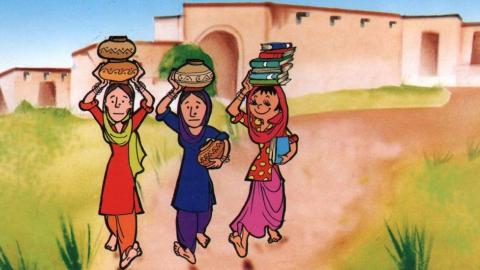
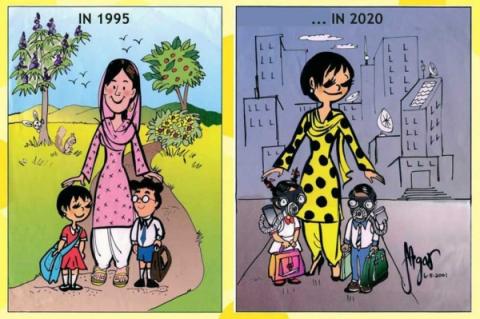
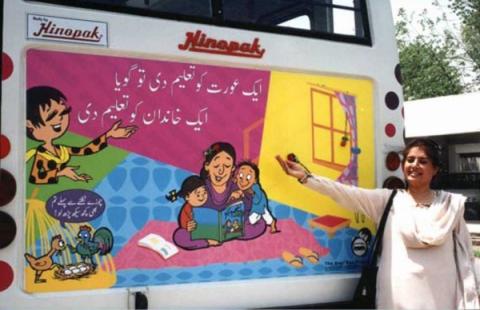
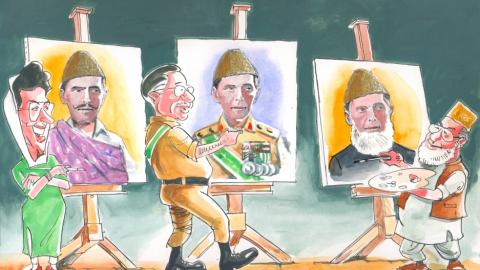
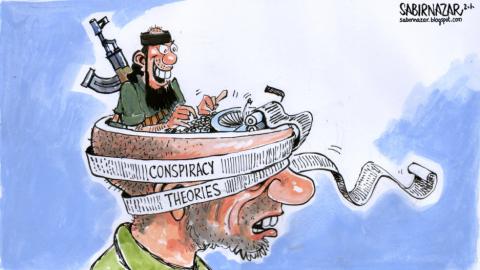
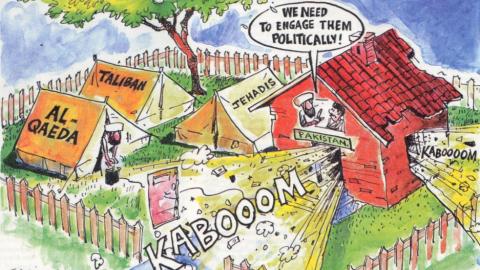

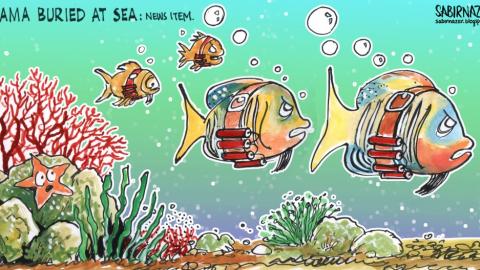
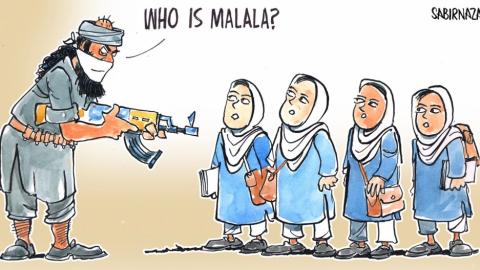

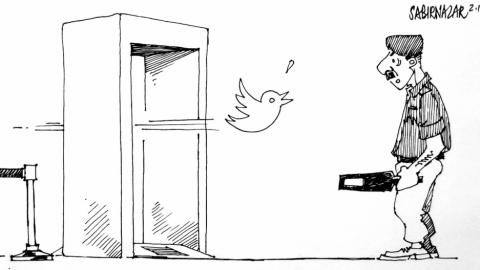

Humors of the World – Pakistan (Nigar Nazar / Sabir Nazar)
By Osvaldo Macedo de Sousa
There are Muslim sectors that claim that the Quran prohibits the act of drawing people and animals, which is why statues, paintings and cartoons are vandalized, just as their creators are targeted by Islamic extremists. An increasingly fanatic and intolerant country is Pakistan, dominated by fear of small groups of the Taliban and other fundamentalist factions. The blindness of stupidity, the intolerance of irrationality can grow in frightened societies, but as long as intelligence is a human characteristic, there will always be those who remain in the fight to maintain the evolution of enlightened and rational civilization. This is what Pakistani artists do, such as Sabir Nazar and Nigar Nazar who, despite having the same surname, are not family members.
Sabir Nazar is one of the main political cartoonists in that country who finds his work increasingly difficult to express: «It is really very difficult to make cartoons about issues such as extremism, militancy or even the judicial system and the army. So there is very limited space to work in Pakistan at the moment.”
Your newspaper has been the victim of several attacks because Pakistan's general “Blasphemy Law” safeguards and justifies all these possible attacks on organizations or people. This doesn't intimidate Sabir, but as he knows that other people are also in danger, he leaves this option of censorship to the editors: «I don't believe in self-censorship, because it further restricts our creative space. So I do what I want to do and leave it up to the editor to decide whether it can be published. I'm not going to reject any idea that comes to me because that's dangerous for me. Whether it is published or not…».
Someone who sails in calmer, but no less dangerous waters, mainly because she is a woman, is Nigar Nazar, who became a professional in the 70s, becoming the first professional Muslim woman in cartooning. «In my country the birth of a girl is not celebrated much, preferring boys, and I hate that». In reality, women in Muslim circles are not very similar, even though they are oppressed and exploited without giving them any value. Therefore, the triumph of a woman in the job market is a double effort and much greater in a sector such as the arts.
Avoiding political issues, Nigar charted his path in the pedagogical and social sphere: «I stay away from topics related to religion, but that doesn't mean that I don't address certain “taboo” topics in between. For example, in some cases I even used quotations from the Quran, and received approval from clerics, to support my cartoons about education as a basic right for women, as well as against sexual harassment». Its main character is «Gogi», an urban and emancipated woman who lives in a male-dominated Pakistan.
«I am inspired by things that happen around me and I use satire because it is like holding a mirror up to society. Messages become effective when I have fun and entertain the audience at the same time. Only then does it become a powerful means».
But is it easy for a woman to publish in the press? «As social issues are not as popular as political ones, it ends up being more difficult, so in addition to the press I also cover advertising, television and comics with series such as the issue of extremism, corruption, girls' education and women's rights. women. You can say a lot of things that you cannot otherwise say.”
Is this pedagogical work through drawing important? "Yes. Humor drawings have a big impact. If you have followers, then your character is very important to message… Lately I've been doing murals with her and lately I've been doing them in hospitals because while they're sitting in the waiting areas, you can have wonderful murals educating people in a way. pleasant".
What is the issue of freedom of expression and thought? «In a way, there is a lot of freedom of expression in Pakistan, but it is limited to topics that do not address a series of more real issues that affect people. There will only be tolerance of total freedom of expression, in the truest sense, when people's mentality also changes».
WORLD OF HUMORS – Fundamentalisms
By Osvaldo Macedo de Sousa
Fundamentalism is a supra-confessional religion that blinds everything, hypnotizes and destroys the black cloak of imbecility. Nobody knows a fundamentalist with a real sense of humor (do not confuse humor with grotesque comedy, because they are antagonistic). If humor is dialogue, critical intelligence, pacifist and tolerant philosophy, fundamentalism is unidirectional, a blockade of intelligent reasoning.
This inability to see beyond your basic perspective creates fears of what lies ahead, terrors of innovation, anguish of being criticized, ridiculed by others, creating anxiety in the face of imaginary enemies that surround and suffocate you. If humor is liberating, fundamentalism does not want to free itself, only to tyrannize.
If today we talk a lot about Islamic fundamentalism, with its deadly attacks on comedians, we cannot forget that Christianity also had times of persecution of humor and "adversaries", just as today we have news of "peaceful" Buddhist monks persecuting and killing other believers and other thoughts…
Ideologies, which are also religious variants of human belief, in their political activism, with their government priests, are often anti-humorous, because they too are afraid of the other side of the mirror that unmasks everything, demystifies everything.
Between 2010 and 2020 alone, we can mention the persecution, arrests and deaths of cartoonists in countries such as (apart from those we don't know about): Sri Lanka (Prageeth Ekknelydod); Syria (Ali Ferzat, Akram Raslan); India (Harish Yadav, Aseem Trivedi, Rachita Taneja); Morocco (Nalid Bahomane); Türkiye (Chahim Barzanji, Musa Kart); Venezuela (Rayma Suprani); Iran (Athena Farghadani, Hadi Heidari); Malaysia (Zunar - Zulkiflee Anwar Alhaque); Algeria (Tahar Djehiche); Tunisia (Jabeur Mejri); Israel (Mohamed Sabaaneh); Egypt (Magdy El Shafel); Thailand (Sakda Sae Lao); Pop. Rep. of China (Jiang Yafei); Jordan (Abu Mahjoob, Emad Hajjaj)…
If fundamentalism is a disease that can affect every human being, can it also infect “humorists”? Of course yes, which also acquires the same symptoms of blindness, deafness and madness, and can be as aggressive, pamphleteer, orthodox, irrational and intolerant as any other fundamentalist.
Being an eternal critic, having the attitude of constantly laughing at others is also known as bad manners, a variant of anarcho-depressive fundamentalism, very common in contemporary society.
Therefore, if there are dangerous attitudes within beliefs linked to religions, political and social ideologies... which are easily identifiable in their open attitudes against freedom of thought and moods, the most dangerous fundamentalisms (such as anti-social attitudes) end up be those who cannot be seen, surreptitious, shamefully designated as bullying, bad manners, youthful irreverence, domestic and school violence..
